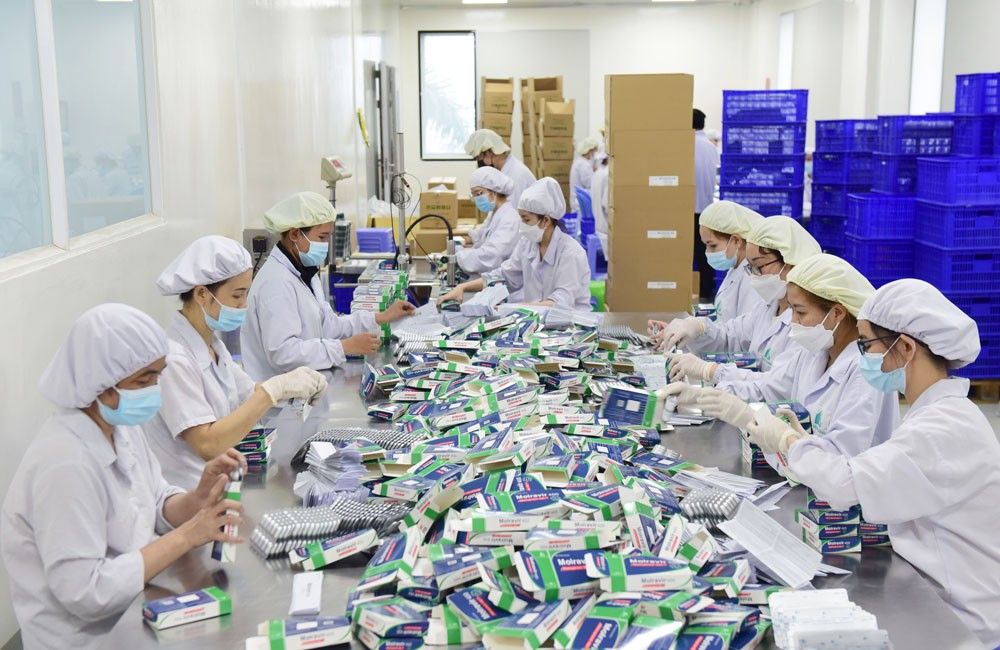 |
According to the Program to develop the pharmaceutical industry, domestically produced medicinal herbs to 2020, with a vision to 2045 approved by the Prime Minister, by 2025, domestically produced drugs will account for 75 percent of the used output and 60 percent of market value.
However, this goal is a big challenge for the pharmaceutical industry when currently domestically produced drugs only account for more than 50 percent of the pharmaceutical market share in Vietnam.
The Drug Administration of Vietnam under the Ministry of Health has so far issued regulations to increase the use of domestically produced drugs in medical facilities.
Amongst regulations issued by the Drug Administration of Vietnam, the most important is the Circular 15/2019/TT on the procurement of drugs at public health facilities. Accordingly, the procurement of drugs by public hospitals will go through a bidding process that is divided according to quality standards. As a result, the two highest drug groups, accounting for about 60 percent of the generic drug package value, are limited to drugs that meet EU-GMP standards of pharmaceutical equivalence and bioequivalence compared with the brand name drug for which it will be substituted.
However, because of low production standards, many domestic enterprises are unable to participate in the high-quality drug segment in hospitals especially groups 1 and 2 - original brand-name drugs, special drugs, and rare drugs of high value.
The lower-class drug groups are facing fierce competition from many domestic and foreign establishments. Therefore, pharmaceutical enterprises can achieve high standards in production such as EU-GMP which will help increase their competitiveness and increase the possibility of winning bids in hospitals.
Assoc. Prof. Tran Thi Oanh, former Deputy Director of the Department of Science, Technology and Training under the Ministry of Health, admitted that although there have been many studies on medicinal herbs carried out in ministries, agencies and localities, a lack of linkage results in overlapping studies, even repeating previous studies, leading to waste of resources. Moreover, many studies are mainly basic research as per scientists’ interest which have been performed sporadically; thus, they were often not carried out to the final product, leading to a lack of practicality and no application in reality
Currently, domestic pharmaceutical enterprises have produced most of the drug forms, but if they want to compete with imported goods and increase market share, they necessarily upgrade drug factory standards, promote research and cooperate with foreign enterprises to transfer technology to produce original brand-name drugs and ones with modern dosage forms.
Mr. Vu Tuan Cuong, Director of the Drug Administration of Vietnam, said that in addition to strengthening cooperation with foreign partners to transfer technology and improve product quality, Vietnamese pharmaceutical enterprises should prioritize the development of domestically available sources of medicinal materials to serve the apothecary industry and drug product development, minimizing the import of raw materials. Therefore, pharmaceutical enterprises should connect with inhabitants in herb cultivation districts to make efforts to develop medicinal herbs, especially in terms of the conservation and development of rare medicinal genetic resources.
The Fourth Industrial Revolution is taking place around the world with a boom in digital technology, requiring pharmaceutical enterprises to step up e-commerce to promote drugs, promote the image of enterprises, access the market, boost sales, and increase profits. In particular, because of globalization, the spread of knowledge and technology across borders has intensified. In the knowledge-based economy, human resources are decisive factors for the survival of enterprises.
Therefore, pharmaceutical enterprises should consider building a separate fund for human resource development, linking and cooperating with professional training institutions in the region and internationally to learn, exchange experiences, and create a foundation for their sustainable development.
























